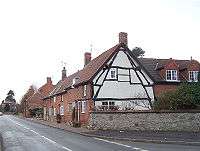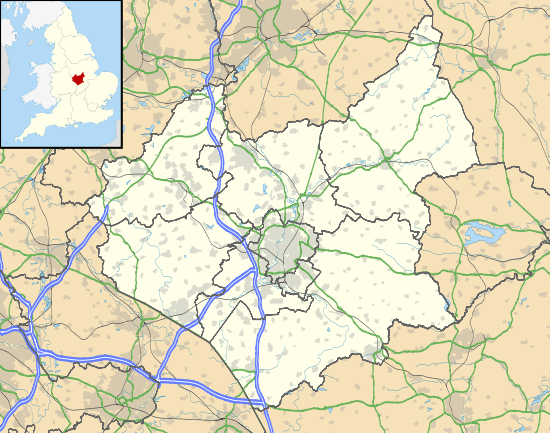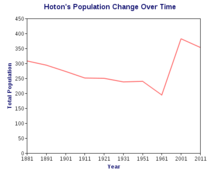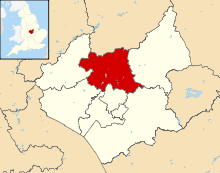Hoton
| Hoton | |
 Hoton Village |
|
 Hoton |
|
| OS grid reference | SK 57475 22566 |
|---|---|
| District | Charnwood |
| Shire county | Leicestershire |
| Region | East Midlands |
| Country | England |
| Sovereign state | United Kingdom |
| Post town | LOUGHBOROUGH |
| Postcode district | LE12 |
| Dialling code | 01509 |
| Police | Leicestershire |
| Fire | Leicestershire |
| Ambulance | East Midlands |
| EU Parliament | East Midlands |
|
|
Coordinates: 52°47′51″N 1°08′56″W / 52.7976°N 1.14902°W
Hoton is a village and civil parish in the Charnwood district of Leicestershire, England. It is on the A60, north-east of Loughborough. The village is just south of the border with Nottinghamshire. Nearby places are Prestwold (to the south), Wymeswold (to the east), and Rempstone (to the north, in Nottinghamshire). Hoton includes a small burial ground in the centre of the village. According to the 2011 Census the population is 353 people.[1]

In 1870, Hoton was described as:
- "A township and chapelry in Prestwold parish, Leicester; near the river Soar and the boundary with Notts, 3¼ miles NE of Loughborough railway station"[2]
History
After the Norman conquest in 1300, together Robert De Jort and Earl Hugh owned the land. Hoton was sparsely populated with eleven households in the 1300s, nine in 1564. By the time the 1666 hearth tax list was drawn up there were nineteen. Hoton once consisted of three 400 acre patches of agricultural land, though due to the 1760 Enclosure Act more small fields were established and agricultural patterns changed. When Charles James Packe II brought the Hoton Manor house it led to the development of the area. An ale house, an inn and two girls boarding schools were build, as well as further farm buildings and cottages, leading to a further increase in population.[3]
Despite this the census reports show a decline in population from 460 people in 94 houses in 1841, to 294 people in 78 houses by 1891.
Throughout the 1800s Hoton saw various changes that improved the parish. Care for the poor, maintenance of roads and facilities were all carried out by able bodied men in the area. Many old wooden built cottages were replaced by brick cottages, as well as given small allotments to give farmers extra growing space for personal use. Sanitation was improved as many toilets were now outside rather than within the home, preventing the spread of disease. Despite this as late as the 1880s cases of typhoid, diphtheria and ringworm we still being treated.[3]
Demographics
Occupation in Hoton is significantly different between 1881 and 2011. Most of the work in 1881 was unknown especially for females, this most likely due to the old patriarchal society of the time. Only workers in dress had a higher female occupation in 1881, all other occupations men had a greater number workers. In contrast in 2011 occupation shifts to more modern jobs and statistics are taken as a total population not male and female. The highest number of people work in professional occupations (46) and the lowest in process, plant and machine operatives. The significant difference in type of occupation is down to the dramatic changes over time. Through the industrial revolution removing significant agriculture reliance to the new computer age of the 21st century.[4][5]
.jpg)
.jpg)
Places of interest
The Packe Arms is a country pub and restaurant in the heart of Hoton. The pub was once known as The Marquis of Granby, though in the 1800s Charles James Packe restored the pub, changing the name to The Packe Arms.[6] Of the 77 public reviews placed on Tripadvisor 55% recommend the bar/restaurant.[7] The Good Pub Guide says The Packe Arms is 'worth a visit' describing the pub as 'spacious old Vintage Inn with sturdy beams and open fires' with 'prompt friendly service from uniformed staff'.[8]
Church of Saint Leonard. St. Leonards is an old church located on Wymeswold Road and is now a private residence. The nearest place of worship is now located in Prestwold. The church had financial issues which concluded with the closure. The major decline began after World War II, land was becoming privately owned which meant the church lost a significant number of its farms. In an attempt to help, the church volunteers helped level out the church grounds in 1969, though after this the structural condition of the church itself only declined. The various contents of the church were given to different churches, most notably the organ to Wartnaby and the pews to Branston.[9]
Transport
Bus - There are two main bus services that run through Hoton. The Kinchbus 9 service connects Loughborough and Nottingham stopping once in Hoton. This service runs up to every 30 minutes.[10] The second bus is the Premiere X9 service, again running from Loughborough to Nottingham. The bus stops at Vine Tree Terrace bus stop which is on the A30 Loughborough Road. The bus runs every half an hour until 11:00pm between Monday - Saturday and the last service on Sunday is at 6:00pm.[11]
Train - In order to get to Hoton by train the closest stations are Loughborough Central Railway Station, which is 2 miles West of Hoton. Alternatively 2 miles South of Hoton is Barrow-upon-Soar Railway Station, though this station is much smaller than Loughborough.[12]
Schools
The nearest primary school to Hoton is Burton on the Wolds primary school. The school is a maintained school 1.3 miles away from the centre of Hoton.[13] The nearest larger capacity secondary school is Limehurst Academy. Limehurst is a mixed academy school located 2.9 miles away towards Loughborough.[14] Limehurst Academy was considered as good in an Ofsted report carried out in April 2013.[15]
References
- ↑ "2011 Census". Neighbourhood Statistics. Office for National Statistics. Retrieved 20 February 2014.
- ↑ Wilson, John Marius (1870–72). Imperial Gazetteer of England and Wales (1st ed.). Edinburgh: A.Fullarton & Co. Retrieved 9 March 2014.
- 1 2 White, Phillip (2006). "The Wolds Historian". The Wolds Historical Organisation. 3: 21.
- ↑ "Occupation data classified into the 24 1881 'Orders', plus sex". A Vision of Britain. Retrieved 24 April 2014.
- ↑ "Occupation (Minor Groups), 2011 (QS606EW". Neighbourhood Statistics. Retrieved 24 April 2014.
- ↑ "The Packe Arms Pub". Vintage Inn. Retrieved 24 March 2014.
- ↑ "Reviews". Tripadvisor. Retrieved 24 March 2014.
- ↑ "Packe Arms Guide". Good Pub Guide. Retrieved 24 March 2014.
- ↑ White, Phillip. "Hoton and its church". Wolds Historical Organisation. Retrieved 23 April 2014.
- ↑ "Kinchbus9". Kinchbus. Retrieved 24 March 2014.
- ↑ "Premiere X9 bus" (PDF). Premiere Buses. Retrieved 24 March 2014.
- ↑ "Local Transport Links". Scout Local. Retrieved 24 March 2014.
- ↑ "Primary School Finder". Retrieved 23 March 2014.
- ↑ "School Finder". Retrieved 23 March 2014.
- ↑ "Ofsted Report". Retrieved 23 March 2014.
External links
![]() Media related to Hoton at Wikimedia Commons
Media related to Hoton at Wikimedia Commons
